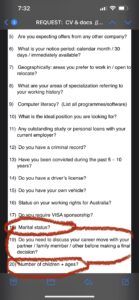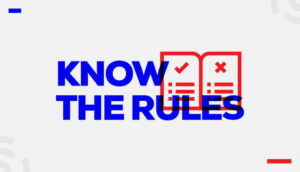
What constitutes a unlawful interview question
Unlawful interview questions are often asked to job applicants. Your answers given to these questions can be used by employers to discriminate against the you (the applicant / candidate). For instance, asking if the job applicant has school-age children, and if they do, not hiring them because of that fact.
There is a reason why potential employers might ask this question and use it to disadvantage you, and this can be due to them not wanting to consider a potential Flexible Working Arrangement, which they may rightfully have to consider. This is because under the Fair Work provisions, after 12 months of employment you can reasonably request a Flexible Working Arrangement if you are “are the parent, or have responsibility for the care, of a child who is school aged or younger”. Just one of many example how what might seem like a simple interview question can be used to discriminate against you.
It’s often difficult to know what actually constitutes an unlawful interview question. In this article, we outline some common unlawful interview questions. Also, how the law protects job applicants from these questions. Unfair Dismissal Australia share two cases where employees won payouts after being asked unlawful interview questions.
Sydney job seeker shares “extremely” unlawful interview questions
In January 2023, a Sydney job seeker made national headlines for sharing some of the unlawful interview questions they were asked. The job seeker had taken to Reddit to share how they had applied for a role at a “large company” and were sent a pre-interview questionnaire.
Most of the questions were pretty standard and legal, inquiring about the job seeker’s notice period, computer literacy and criminal record. Also, about the “ideal position” they are looking for, if they have a drivers license, and their areas of specialization. However, as the job seeker made to the end of the questionnaire, they noticed that it contained a few “extremely illegal” questions.
“Just got a ‘pre-interview questionnaire’ for a Sydney-based position,” the job seeker wrote. “Highlighted questions are extremely illegal, right?” One of the unlawful interview questions highlighted by the job seeker inquired about their marital status. While another asked if they needed to discuss their career move with their partner or a family member. And the questionnaire ended with one more unlawful interview question inquiring how many children they have, and their ages.

The job seeker said that they were left flabbergasted by the “totally dodgy” unlawful interview questions asked by such a well-established company. “Honestly shocked that a company this big would pull this shizz,” wrote the job seeker. “This isn’t an independent shop, this is a large company. Even more shocking.”
Intend to discriminate against you
Commenters on the Reddit post urged the job seeker to “name and shame” the company. And one commenter suggested that the only reason they were asked these unlawful interview questions was “because they’re intending to use that information to discriminate against you.” While other commenters also took issue with questions asking if the job seeker was expecting any other job offers. And if they had any study or personal loans outstanding.
The job seeker said that they are “running so far and so fast” from the company, and that they plan to “report them to Fair Work.”
How do you know what is an unlawful interview question?
Perhaps like this Sydney job seeker, you too have been asked about something during an interview that could be an unlawful interview question. But it’s often difficult to know what exactly is or is not an unlawful interview question. Particularly if it is being asked by a large, well-established company who you would assume abides by the law.
It’s important to remember that the main focus of an employer during the interview process is to ask questions to assess if the job candidate has the ability to perform the role on offer. And due to the general protections provisions of the Fair Work Act 2009, they must be very careful not to stray too far from that main focus.
The general protections provisions prohibit employers from discriminating against both employees or job candidates. That is, based on one or more of their protected attributes. These protected attributes include their age, sex, sexual preferences, race, skin colour, religion, political opinion, national extraction, social origin, disability, marital status, pregnancy, or their family or carer’s responsibilities.

What are examples of unlawful interview questions?
The general protections provisions mean that interview questions about the aforementioned protected characteristics are unlawful. Examples of unlawful interview questions include:
- Are you married or planning to get married?
- Do you have children who need to be picked up from school?
- Are you pregnant or planning to start a family?
- Is English your native language?
- Which political party do you usually vote for?
- What is your cultural background?
- Are you a regular churchgoer?
- How old are you?
- Do you have to provide regular care to any family members?
- Do you have any disabilities?
- Are you a member of a union?
Answers from questions like these can provide an employer with information that they could use to remove you from the recruitment process. Or in other words, to discriminate against you based on a protected characteristic.
Unlawful interview questions: Sometimes there are exceptions to the rule
Sometimes, an employer may ask what seems to be an unlawful interview question. But in some cases, it may not be unlawful as it may be necessary to ask. The Fair Work Act 2009 allows employers to solicit information regarding protected characteristics if it is needed for a non-discriminatory purpose. That is, to know if the applicant can satisfy the inherent requirements of the role on offer.
For example, if an employer is interviewing for a role that requires physical exertion, they can ask the candidate if they are physically fit.

Bus driver who was asked unlawful interview question wins huge payout
One example of an employee being asked an unlawful interview question was highlighted in the general protections case Chalker v Murrays Australia Pty Ltd [2017]. In 2015, bus driver Greg Chalker applied for a job with Murrays Australia. And he was asked this unlawful interview question:
“Do you suffer from any medical condition, disability or injury that may have an effect on your performance of the duties in the job for which you have applied?”
Employer asking a question
Mr Chalker answered “no” to this unlawful interview question. This was despite previously receiving a diagnosis of borderline personality disorder. The diagnosis, however, had not stopped Mr Chalker from driving buses. And therefore, he felt he did not need to reveal his diagnosis given that it did not affect his ability to drive buses.
However, to treat his borderline personality disorder, Mr Chalker was taking several prescription medications. And these medications were revealed to Murrays when Mr Chalker was required to take a urine test as part of a medical assessment. With the truth laid bare, Mr Chalker decided to inform Murrays about his borderline personality disorder.

Employee is discriminated against for his medical condition
The doctor who conducted the medical assessment concluded that Mr Chalker was “temporarily unfit” for the position on offer. However, he also stated that Mr Chalker’s borderline personality disorder would not affect his ability to drive a bus. But Murrays did not heed the doctor’s words. The company believed that “there will be problems down the track with [Mr Chalker] because of his behaviour.” Therefore, Murrays opted to reject Mr Chalker for the position on offer.
Employee stands up for his rights through the Fair Work Commission
Following his rejection by Murrays, Mr Chalker felt that he had been discriminated against for his medical condition. So he lodged a general protections discrimination claim with the Fair Work Commission. At Mr Chalker’s general protections hearing, the NSW Civil and Administrative Tribunal rejected Murrays’ argument. Namely, that it had rejected Mr Chalker due to his dishonesty in not disclosing his medical condition when asked.
The Tribunal dismissed any claims that Mr Chalker had been dishonest. It found that he was being honest when he thought his borderline personality disorder would not affect his ability to drive a bus. Namely, because he had been driving a bus for over a year since his diagnosis. This meant that he did not have to answer the unlawful interview questions about medical conditions. Ultimately, the Tribunal ruled that Mr Chalker had been discriminated against due to his borderline personality disorder. It therefore ordered Murrays to pay him $10,000 in compensation.

“You are too old, cheers mate:” 61-year-old laughed at after answering unlawful interview question
A perhaps more blatant and shocking example of a job candidate being asked an unlawful interview question formed the focus of the general protections case Galstaun v Adept Underpinner Pty Ltd [2021].
The case concerns John Galstaun, a NSW job seeker who had a history of working in the construction industry. In November 2019, Mr Galstaun saw a job ad online for a casual construction worker position at Adept Underpinner. The ad stated that Adept was looking for fit and agile candidates. But it did not outline any age restrictions.
“Stunned, very offended and shocked:” Mr Galstaun is asked unlawful interview question
Mr Galstaun decided to give Adept a call to inquire about the position. His call was answered by Adept’s director, Leslie McDougall, who promptly asked him for his age. Asking a job candidate their age is, as we outlined earlier, an unlawful interview question. But not knowing that, Mr Galstaun replied that he was 61 years old.
What happened next “stunned” and “shocked” Mr Galstaun. Mr McDougall burst out laughing. Then, in between laughs, he said that if Mr Galstaun were hired, he would likely have a heart attack. Mr McDougall finished by saying that he didn’t want someone having a heart attack on site. He then said “you are too old, cheers mate,” and hung up. Feeling that he had faced age-based discrimination, Mr Galstaun subsequently made a complaint to the NSW Anti-Discrimination board.

“Humiliated, ridiculed and diminished:” Mr Galstaun details hardship due to unlawful interview question
In his complaint, the employee cited the unlawful interview question asked by Mr McDougall and his reaction to the revelation of his age. He claimed that this amounted to direct discrimination in employment on the ground of age by Adept. This age-based discrimination violates the Anti-Discrimination Act 1977 (NSW).
Mr Galstaun said that he felt “humiliated, ridiculed and diminished” due to the unlawful interview question asked by Mr McDougall, and his response to his answer. He also said that lost confidence to apply for construction positions that advertised that candidates should be strong.
Adept was required to respond to the complaint. Mr Galstaun later told the NSW Industrial Relations Commission that he was “belittled and degraded” by Adept’s solicitors. They stated that Mr McDougall did not recollect asking the illegal interview question or the conversation, other than that they spoke briefly about the position.
Adept’s solicitors claimed that Mr Galstaun had made “assertions, allegations, innuendo and conclusions” about what Mr McDougall said. They stated that the company denied any discrimination took place, and that it was ready to “vigorously defend in any tribunal or court.”

Mr Galstaun wins payout for being asked illegal interview question
Mr Galstaun’s case was heard by the NSW Industrial Relations Commission, (IRCNSW) which favoured his side of the story. It accepted that the illegal interview questions was asked and that the conversation took place as he described. And that this led to Mr Galstaun avoiding construction work for three months. But the Tribunal also noted that it wasn’t a case of repeated or prolonged discrimination.
The Tribunal therefore ordered Adept to pay Mr Galstaun $2,990 for being discriminated against during the phone call. And it awarded another $750 in aggravated damages due to the “hurt and distress” that the solicitors caused by their response to the discrimination complaint.
Have you been asked an unlawful interview question?
Employers have no right to ask unlawful interview questions and reject you for a role based on your answer. If they do, make sure to make them pay. As Australia’s leading workplace mediators and commentators A Whole New Approach (we are not lawyers) can help you take action through the Fair Work Commission.
Over the last two decades, we’ve assisted over 16,000 Australian workers lodge claims with the Fair Work Commission. We can guide you through the process of making a general protections or unfair dismissal claim and ensure it’s a success. Take advantage of our no win, no fee service. Plus, a consultation with us is completely free.
So, if you would like to have a no-obligation confidential conversation with us, get in touch on 1800 333 666.
or search our website www.unfairdismissalsaustralia.com.au







